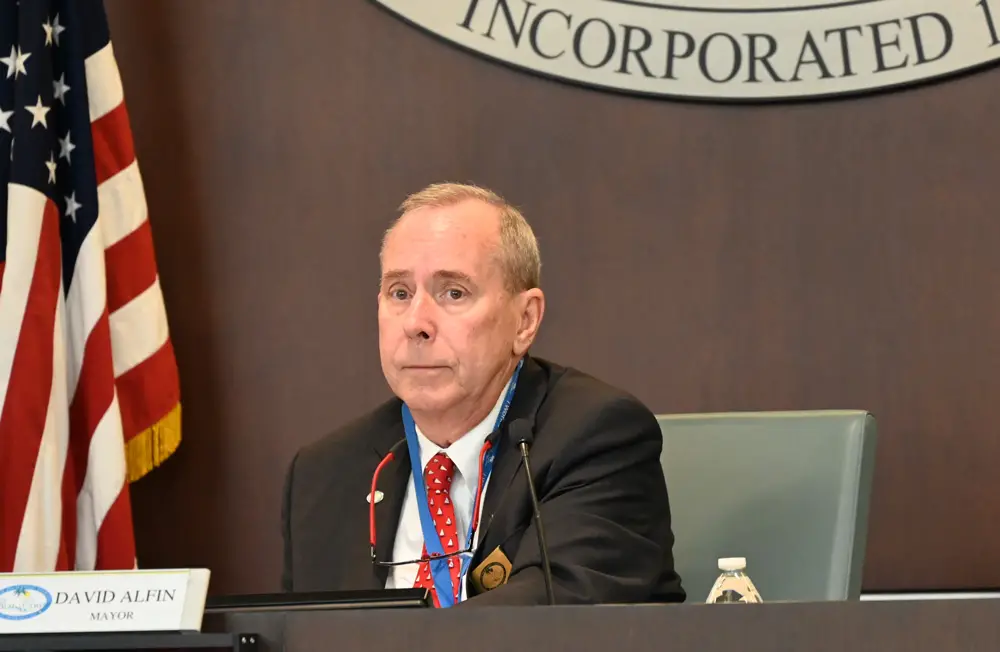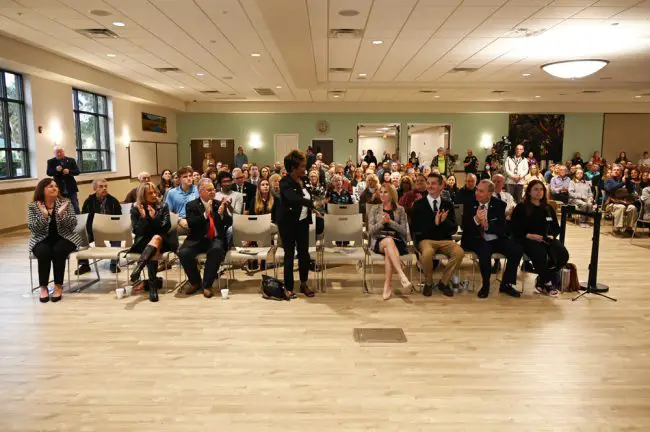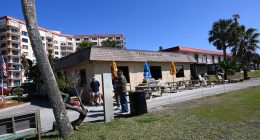
When three members of the Palm Coast City Council voted to fire City Manager Denise Bevan on Tuesday, none of the three explained why beyond vague generalities about going in a different direction that does not seem much different than where the city has been going–more development–and balancing the “competing interests” of growth and quality of life, as Mayor David Alfin put it.
In a 40-minute interview Tuesday afternoon, Alfin explained what led him to make his motion, threading a needle between lavish praise for Bevan in one sentence and sharp criticism of city management in the next, while explicitly conceding that Bevan may have been the victim of political circumstances. He said “rumors” had been building for months, and that, as he told her before the vote, he no longer had “the ability to hold back the tide.”
What rumors? “There’s been rumors about changes without any definition about what those changes might be, and I hear that from folks in the streets, people I know,” Alfin said. “I believe that Denise was aware of the banter as well.”
Bevan, in sum, paid a paid a price for political currents she was not in control of. “That’s exactly correct,” Alfin said. “So is she a victim of the political circumstances? No question about it, and I said that to her. That, my friend, is part of the fact of city managers.” County and city manager tenures are notoriously unpredictable, some stretching to patriarchal lengths, many ending abruptly if not always unexpectedly, as did that of William Whitson in Flagler Beach last year and that of County Administrator Craig Coffey, after a longer agony, in 2019.
Whitson had been hired through the very process that Alfin is suggesting could be used to hire Palm Coast’s next manager: the “Range Riders” counsel of retired city managers who shepherd cities to their next appointment. But that process is fraught with favoritism and subjectivity, as was the case in the hiring of Whitson–by his old boss of eight years in Port Orange, Ken Parker.
“These are risky times. You’ve got politics at play, you’ve got people that maybe don’t understand good governance, people that may be serving for the wrong reasons. All of that puts an executive at risk,” Alfin said, a veiled allusion made more explicit later in the interview to the way certain issues–drainage problems in parts of the city, utility costs–have been weaponized for political ends in an election year.
Three seats are up on the council this year. Alfin is running for re-election. Council members Ed Danko and Nick Klufas are running for County Commission seats, which means at least two seats, possibly three, will turn over on the council. Bevan had nothing to do with that weaponization, and everything to do with redirecting city staff to address drainage issues as few issues have been prioritized to quickly, upending other priorities. Alfin recognizes the pivot.
“Make no mistake, I have not a single negative thing to say about Denise and her performance,” Alfin said, promising to help her to forward her career. But his charge is to ensure that the city has the “best qualified, best experienced top talent to lead us forward while making sure that today’s residents are happy with the reason they came to Palm Coast, because it’s a dream.” Which is to say that Bevan was somehow not that person.
Sounding at times overtly patronizing toward Bevan, he said removing her was in residents’ best interest and hers, “in terms of her future. I know it sounds awfully vague, but change is inevitable especially when you have just such special unique opportunity ahead, and sometimes you need new perspectives to navigate those challenges.”
Alfin said the public may not have understood where he was coming from because it does not see “the underside of the belly of the beast,” which itself suggests more deep-seated problems. Asked to elaborate, he said: “There have been several issues that have not been handled as well as I hope they would have been, and to qualify that I’m not sure some of them have a solution, so perhaps being in charge at the wrong moment in time is tough. If there are problems in the city at the end of the day they all bubble up and you’re the boss.”
Alfin spoke candidly of three specific problems that contributed to Bevan’s demise, only one of which could be directly attributed to her: Palm Coast Connect’s inadequacy, the Utility Department’s request for rate increases, and strategic decisions related to the utility’s ask. The first two were not Bevan’s doing. The third was, at least in Alfin’s view.
Alfin wanted Bevan to be more politically attuned to the reality of an election year, and to have delayed a controversial utility rate study that could be turned to political ends until a non-election year. In other words, Bevan’s a-political approach–an approach city and county managers are trained to follow–worked against her. Managers are not comfortable making politically driven decisions. Doing so raises ethical questions that run counter the profession’s code. The politics are for the elected officials to deal with. In this case, the elected took a lot of flack over a sensitive issue. Alfin blames it on Bevan.
“The utility rate hike study was presented at the beginning of an election cycle,” Alfin said. “I think that’s wrong because I think it could have been done a year ago and not become part of political pandering or footballing or whatever. The problem is when you allow it to fall on the calendar this way, I don’t know that you debate and consider it on its true merits without a thought of how this will affect the upcoming campaign, and I think at the top level of leadership, those kind of questions are very important.”
Alfin considers the city’s customer service to be sub-par. Palm Coast Connect, the online tool the city has been using since 2019 to communicate with residents when they have issues and want problems solved, to be the wrong tool, and to have caused its own share of problems and misunderstandings. He’s making it part of his Strategic Action Plan, or future goals, to eliminate and replace.
“Palm Coast Connect is described as being problematic,” he said, and not salvageable. “I’m not convinced that our customer service team is an A-tiple plus. When you start putting things together, all of these things need to improve.” The city is not responding to people’s complaints in a timely way, he said, and the system itself has confused customers with automatic responses that suggest cases may be closed when they’re not, causing frustration.
“There’s a long road ahead of us to be able to communicate effectively, efficiently and continuously to the public,” the mayor said. He stressed that he was critical of Palm Coast Connect, but not of the city’s Communications Department. “Our team is the best,” he said of that department.
Alfin was also displeased not just with the timing of the utility rate increase but with the merits of the increase itself. Here, too, there was needle-threading by the mayor: he does not dispute that the city’s infrastructure is aging and that it needs a lot of work, and therefore a lot of money. He speaks of that publicly and frequently. But he disputes the department’s method and conclusions.
“I was very clear when I voted no about the utilities’ ask for large increases of money, and explained very carefully that I was unwilling to invest further in the utility department at this moment, until I was assured and felt confident their plan was correct,” Alfin said. “I did not have that confidence.”
Diametrically opposed words to those Alfin had spoken of the utility department and its rate study during the State of the City address only last month: “You have all played pivotal roles in maintaining Palm Coast’s infrastructure, and we are grateful to you for your determination and effort,” he’d said. “We also conducted a thorough study that looked at different scenarios for addressing utility rates. We understand that hearing about possible increases in utility rates can be unpleasant. But please know that these decisions are not made randomly. They’re part of a plan to ensure our utility services remain exceptional both now and in the future.”
The department was asking for an 18 percent rate increase over four years, coming off equally steep rate increases over the past decade that had been rationalized for the same reason: the infrastructure is aging. The department was also asking for a steep increase in utility impact fees, the one-time levy on new construction. That revenue is used to defray the cost of new infrastructure, not existing infrastructure. The council approved the impact fee increase, with Alfin dissenting. It did not approve the rate increase.
“As a result changes have been made in the utility department, which I’m sure you’re aware of,” Alfin said, referring to the removal of Steve Flanagan from the director’s position. Bevan had explained that the removal was more of a shift to a position that would enable Flanagan to develop a succession plan at the department. Alfin said Flanagan “voluntarily took a different job title,” but the mayor connected that both to the “phenomenal ask” for a rate increase and to what he saw as the department blaming the council for the need for that ask.
“I need to know they have a plan in place so that stuff really gets fixed,” Alfin said. “Changing Steve is a step that’s probably part of a whole strategic plan to raise the bar in one particular department, and you can pick other departments.”
The interview suggests that rather than a City Council firing, it was very much Alfin’s move to push Bevan out, just as it had been Alfin’s to push her into the job two years ago. Fellow-council members Ed Danko and Cathy Heighter seemed unsurprised when Alfin made the jaw-dropping motion, like supporting actors following a script. Their jaws were as unperturbed as if Alfin had been talking about the recent Strawberry Festival at Town Center. Danko left the room immediately after casting his vote.
Only the dissenters, Nick Klufas and Theresa Pontieri, recoiled with controlled fury, raising questions about the appearance of a pre-arranged coup that in their view implied a sunshine law violation.
Alfin dismissed all suggestions of a pre-arranged vote. “That’s not a dream vote you look for, I’m always a big fan of unanimity,” he said of the 3-2 split. “If I knew it was going to be that close, would I have approached it differently? Perhaps.”
He said Bevan knew his motion was coming. He’s spoken to her ahead of time. “I consider our relationship very close, so I do not ever spring surprises on those that are stake holders,” he said, detailing what he told her ahead of the meeting: “My words were no more complicated than there’s a time that’s been coming because this rumor has been floating for months and months. I no longer have the ability to hold back the tide.”
Alfin’s firing motion also included engaging the services of the Florida League of Cities’ help in finding the next manager, “the sooner, the better.” He dismissed proposals by Pontieri to delay the decision until the next council is seated. “I took exception to the comment because I was thinking to make this decision, are you better making it with an experience group, even though they may not all go forward, or are you better putting it in front of the experienced group,” he said, describing the delay as kicking the can down the road. “I thought the argument was light.”
Assistant City Manager Lauren Johnston is now the acting manager. Alfin was asked whether the search for the next manager would look inward, specifically to Johnston and Jason DeLorenzo, the chief of staff. “I consider those two top shelf,” Alfin said. “But I’ve not ever sat and talked to them about their career path because it was not my job to do that. I can tell you this: I would never offer them up and risk their careers until I was absolutely sure that it was something they wanted and that it was a good fit.”
The mayor said the council will likely have to hold a special workshop to more clearly decide on next steps.
As for his own decision to motion for the firing of Bevan, Alfin said it was nothing like the appearance of calm he projected during that segment at the meeting Tuesday, and it was never an unequivocal decision. I wasn’t calm at all. My insides were anything but calm,” he said.
“It’s been spinning in my mind for some time. I can’t tell you a particular moment. I think I’ve tested myself, yea, nay, countless times,” he said. “You second guess yourself relentlessly. I finally got to a point that I felt all things considered, it would offer the best outcome to the residents and the employees as well. But it was not an epiphany.”
![]()











